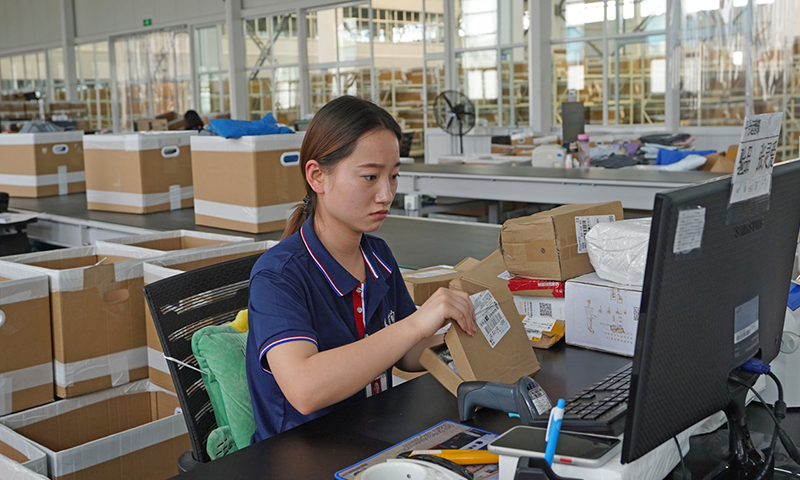Giants battle for market share as consumer spending rebounds in 618 shopping festival
By Xie Jun and Chu Daye Source:Global Times Published: 2020/6/17 21:48:40
Giants battle for market share as consumer spending rebounds

An employee sorts and packages e-commerce orders at a cross-border trade company in Rongcheng, East China's Shandong Province on Tuesday. Offical data showed China's exports rose 1.4 percent year-on-year in yuan terms in May, while imports fell 12.7 percent. Photo:cnsphoto
Domestic e-commerce giants are engaged in a pitched battle for the mid-year online shopping spree known as "6/18 shopping festival," offering unprecedented discounts and rebates and miscellaneous promotions, as China's consumption has recovered to pre-pandemic levels.
JD.com, which initiated the online festival years ago, announced it would offer at least 10 billion yuan ($1.41 billion) in rebates and 100 billion yuan worth of discounts, making discounts in this year's event the biggest ever. It also signed a collaboration pact with Chinese video-sharing platform Kuaishou, which added its own rebates.
Alibaba's Tmall.com is offering what it calls unprecedented discounts --nearly 15 billion yuan in coupons. The company will also arrange live-streamed shows featuring more than 300 pop stars and 600 company presidents.
Pinduoduo.com, another e-commerce giant, is doing away with promotional strategies like presales in favor of jaw-dropping discounts such as offering the iPhone 11 at less than 10 yuan.
Chen Da, executive director of Anlan Capital, said that these giants are going all out for market share as China's e-commerce sector continues growing despite an economic slowdown and coronavirus-induced disruption.
"The growing market shows that e-commerce is an area that is worth fighting for, and no company dares to take the festival promotion lightly," Chen told the Global Times.
The e-commerce giants aim to make the 6/18 festival into the biggest online shopping event since the start of the pandemic, as willingness to consume and business confidence continue to recover in China, a report by global analytics firm Nielsen showed.
"Since the outbreak of the virus, China's experience in fighting off the disease has been a barometer for the world. As life gradually returns to normal, consumer-driven domestic demand is recovering in China, which has injected optimism into the wider global market," Justin Sargent, president of Nielsen China, told the Global Times.
The Nielsen report also showed that as to the pandemic's impact on companies, 75 percent of respondents believed their situation in the second quarter was "optimistic" or "not affected," a marked improvement from 40 percent in March.
Sales data revealed so far related to the 6/18 festival also signal warming consumption. For example, sales on JDDJ, Dada Group's on-demand retail platform, increased 138.8 percent year-on-year from June 6 to Sunday during the 6/18 festival, according to data Dada sent to the Global Times.
However, some experts doubt whether the festival can fuel a full-fledged, lasting consumption recovery as pressure persists on consumers' ability and willingness to spend.
"There's a possibility that people will be more cautious in spending in the second half of the year, as they can't rely on their savings as easily as in the first few months after the coronavirus outbreak," said Zhang Yi, CEO of Shenzhen-based iiMedia Research, adding that e-commerce giants like JD.com want to grab consumers before this trend kicks in.
Zhang predicted that because of heavy discounts, sales in this year's 618 festival might be similar to or slightly more than last year, but no surge is coming.
"I think consumption won't completely return to normal until three or four months after the coronavirus ebbs, which should arrive after a COVID-19 vaccine is available," Zhang noted.
Newspaper headline: Heated battle in 6/18 shopping festival
Posted in: INDUSTRIES,MARKETS